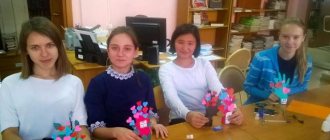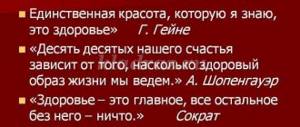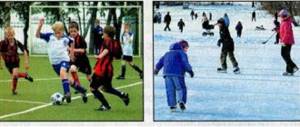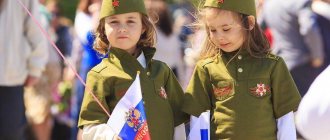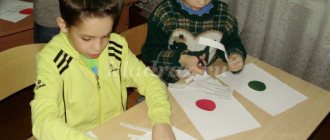Health week at school. Event plan
Action plan “Health Week”
Objectives: • Identify the abilities and interests of children. • Nurture strong-willed qualities, develop the desire to win and self-confidence. • Teach not only to receive joy from your results, but also to worry about your comrades. • Raising a generation striving for a healthy lifestyle by involving children in such forms of organizing health-improving work as sports relay races, competitions in various sports, and propaganda presentations on health topics. Objectives: • To promote the formation of students' skills in leading a healthy lifestyle; • Contribute to the development and improvement of such qualities as endurance, agility, strength, thinking, and the ability to coordinate their movements; • Help determine the value of your health and measures to preserve it; • Attract children's attention to a variety of sports. Participants of the holiday : students of grades 1-9, teachers. Decoration of the sports ground : posters “A healthy mind in a healthy body.” Organizational stage: 1. Drawing up a school-wide regulation on the Day of Health and Sports and an action plan.
2. Drawing competition on the topic: “If you want to be healthy, do sports!” Event plan:
Day 1: “Opening of health week.
Protection of posters dedicated to a healthy lifestyle (grades 1-9). Outdoor games" Day 2: "Football tournament. Sports and educational game “Scouts”” Day 3: “Fun starts (junior, senior level). Cross of Nations" Day 4: "Conversations about a healthy lifestyle: •"Lessons from Moidodyr" •"Take care of your health from a young age" Oral journal "We are for a healthy lifestyle"" Day 5: "Hike "Journey to the Land of Health"" Day 6 "Training “Steps leading down” Day 7: “Health relay. Summing up the results of the health week” Work with educators: • Group educators develop action plans for physical education and health work in their areas. If necessary, adjustments are made to the existing plan. Independently study materials on the “Health Day” (articles, publications from magazines and other sources). • Design of an exhibition of methodological materials for conducting a week, rough planning of work with children, notes on educational thematic classes, scenarios for themed evenings of entertainment, a selection of children's fiction, paintings, illustrations, albums, photographs, didactic games. • Design of an exhibition of children's drawings and crafts, photographs “A healthy mind in a healthy body!” » Working with children: • Daily preventive work. • Preventive health measures. • Awakening gymnastics, “health” path. • Game self-massage, breathing exercises. • Walking, changing the pace to a faster one depending on the weather (“Traincourt”). Classes: • Physical education classes with a valeological focus. Plot-thematic: “Doctor Neboleikin’s Rules”, “Visiting Syrupchik”. “Visiting a healthy woman” (forming a positive attitude towards a healthy lifestyle). Conversations with children: • “I love vitamins - I want to be healthy”; • “Safety Lessons”; “Conversation about health, cleanliness”; “My family and physical education”, • “How do you do physical education at home”; • “Journey to the land of health” “Consolidation of knowledge about personal hygiene”; “Take care of your health”; “To be healthy, you must be clean”; “We are friends with physical education”; “Health is the main wealth”, “On proper nutrition and the benefits of vitamins”; "Vitamins and health"; “Is it possible to protect yourself from injuries”; "Friends of Moidodyr"; “How to call an ambulance”; “My day off (on a sports theme)” Looking at photos “Sports calendar”. (for younger children). Solving provocative questions and problematic situations. Meeting with “Vitamin”, who talks about the importance of nutrition in human life + didactic games. A conversation-game that includes jokes used when washing hands. Games: Sports and educational game “Scouts” with elements of sports exercises. Didactic games: “Swimming, riding, jumping”, “Sportloto”, “Guess the sport”, “How to properly dress an athlete for competitions”, “Pharmacy”, “Visiting Doctor Aibolit” and others. • Organization of outdoor games, round dances with recitation, ball games. • Independent motor activity. • Quiz “Situation”, “Doctor Aibolit”, “Vitamin Family”, “Evening of riddles and guesses”. Work in the literary corner: Examination of illustrations, photographs, paintings about health. Learning proverbs, sayings about health, speeches, nursery rhymes about washing, sports-themed songs, poems, riddles. Reading fiction on the topic of health, cleanliness and sports. Exhibitions: Exhibition of children's drawings, crafts, photographs on the topic of health. “Journey to the land of health”, “A healthy mind in a healthy body.”
We recommend watching:
Winter Small School Games. Scenario for primary school World Health Day at school. Scenario Methodological development of a thematic day to preserve the mental and physical health of students on World Health Day in a correctional school. Scenario
Similar articles:
Health day at school. Scenario
Scenario of the school-wide sports festival “Health Day”
Class hour for Health Day for schoolchildren in grades 6-9
Plan of sports work at school for the 2014-2015 academic year
PLAN FOR ORGANIZING PHYSICAL EDUCATION, HEALTH AND MASS SPORTS WORK AT SCHOOL FOR THE 2014-2015 SCHOOL YEAR
Goals, directions, plan for sports work at school. Goals:
- Preserving and strengthening the health of children and adolescents, nurturing the need for systematic physical education and sports.
- Propaganda among schoolchildren and introducing them to a healthy lifestyle. Fostering the need and ability of schoolchildren to independently engage in physical education and use various sports games in organizing their recreation.
- Education of students in folk traditions.
The program includes nine main directions for the development of sports, recreational and mass sports work at school.
Sports work at school
| ACTIVITY | Dates | Responsible for implementation |
| Physical education and health activities during the school day: • Discuss at the pedagogical council (or meeting with the director) the procedure for conducting physical education minutes, outdoor games during breaks, and gymnastics before classes. • Conduct conversations in classes about the student’s daily routine, about the procedure for doing gymnastics, outdoor games during breaks and physical education classes. • Carry out outdoor games and physical exercises during big breaks. • Conduct physical education sessions in general education lessons. • Conducting conversations with primary school teachers on the organization of health-improving activities during the school day and holding a “Health Hour”; | Before the start of the school year Until September 15 Daily Daily Throughout the year | School administrationClass teachers Class leaders Subject teachers |
| Sports work in classes and sections: • In classes, appoint physical educators responsible for conducting outdoor games during big breaks and organizing teams to participate in competitions. • Create a schedule for sections and team training. • Organization of sections. • Preparation of class teams in sports included in the intra-school sports competition. • Organization of “health hours”. • Class hours “healthy lifestyle”. • Ventilation of classrooms | Until September 1 Until September 15 Weekly Throughout the year Daily | Class teachers Physical education teacherTeachers |
| Extracurricular activities at school: • Football and mini-football competitions • Autumn and spring cross-country • Tourist rally • Olympics in physical education • Basketball competitions • “Fun starts” among primary classes • Cross-country skiing • Ski relay race • Volleyball tournament • Military-patriotic game “ Zarnitsa" • Athletics triathlon • Health Day • Presidential competitions • Tourist hike in the forest • Competitions within classes and sports sections • Military sports relay race for February 23 “Strong, brave, dexterous” • Badminton tournament | During the year (see table) | Physical education teachers |
| Participation in regional competitions • Sports games (volleyball, basketball, tennis, badminton) for grades 5-11 (September-May). • Autumn and spring crosses (September - May). • Mini-football competitions (during the year.) • Spartakiad for schoolchildren (May). • Athletics all-around (September - May). • Presidential competitions (May) • Zarnitsa sports festival (June). • Olympics in physical education (November) • Tourist rally (May-June) • Rifle shooting competitions (April) | During the year. (according to the plan of sporting events in the area). | Physical education teacher |
Grid plan of sporting events
| № | Name of events | Dates _ | Location _ | Responsible for carrying out |
| Intraschool competitions | ||||
| 1. | Autumn and spring cross-country (grades 5-11) | September – April | Playground | Physical education teachers |
| 2. | Mini-football (grades 5-11) | April | Playground | Physical education teachers |
| 3 | “Presidential competition” (grades 1-11) | November | Playground | Physical education teachers |
| 4. | “Fun Starts” (grades 1-4) | Once every quarter | Gym | Physical education teachers |
| 5. | “Fun Starts” (grades 3-4) | December | Gym | Physical education teachers |
| 6. | Gymnastics (grades 7-10) | December | Gym | Physical education teachers |
| 7. | Olympiad (theory) (grades 8-11) | January | Gym | Physical education teachers |
| 8. | Basketball (grades 8-10) | February | Gym | Physical education teachers |
| 9 | Mini-basketball (grades 5-7) | February | Gym | Physical education teachers |
| 10. | Volleyball (grades 8-11) | March | Gym | Physical education teachers |
| 11. | Pioneerball (grades 5-7) | March | Gym | Physical education teachers |
| 12. | Mini-football (grades 5 – 11) | April | Playground | Physical education teachers |
| 13. | Athletics (grades 1-11) | April | Gym | Physical education teachers |
| 14. | Badminton | March | Gym | Physical education teachers |
| 15. | “Health Day” (grades 1-11) | May | Playground | Physical education teachers |
| 16. | Track and field eventing | September | Playground | Physical education teachers |
| 17. | Military-patriotic game "Zarnitsa" | May | Playground | Physical education teachers |
Sports event “Fun Starts” for grades 1-4
Class hour in 7th grade “Passing the GTO!”
How and what events can be held?
Each school already has its own established traditions for celebrating this day. Some organize it within the walls of an educational institution and on school grounds, some go out of town, others go with the whole school to the nearest park. A script is being specially developed for this holiday. Strict regulations must be established and a person in charge is assigned.
We will not give a scenario for a health day at school here, since the conditions and opportunities for each educational institution are different. But we will give you tips and recommendations, thanks to which your sports program can be expanded or updated.
As a rule, events for Health Day at school begin in the morning. Children gather at a school-wide meeting, where the daily schedule is announced to them. It may include sports relay races, theatrical performances, competitions between classes and parallels. Schoolchildren are by nature gambling and take part in games, competitions and quizzes with pleasure.
Groups of different ages
Some schools successfully use the multi-age squad method, when children from different classes are united into teams. Each such squad is assigned its own name, motto, and a squad song is chosen. Competitions are held between such teams, and at the end of the day the results are summed up.
Competitive programs
Health Day at school can be opened with a competition program “It’s great to be healthy!”, the main idea of which is that health should be protected constantly, and not just one day a year. Children can prepare proverbs and sayings about health. Create a family wall newspaper “My family is for a healthy lifestyle!” Also, children can draw pictures at home or in the classroom about how they imagine health and a healthy person.
Lessons and moments of health
On Health Day, in every lesson or activity, it is important to focus on maintaining health, for example, during the lesson, take short breaks - minutes of health - during which you invite children to do gymnastics for the eyes (once again we remind you about reading and writing hygiene) or for the body ( we give rest to the spine, we remind you of the importance of correct posture). Ideally, each lesson should begin with a little exercise. During breaks, we make sure to ventilate the classroom, and send the children to the corridor, where we organize moderately active games. Let the children tell themselves why it is necessary to regularly ventilate the premises.
We remind you about your daily routine and proper nutrition
In addition, World Health Day is a great opportunity to remind students how important it is to maintain a daily routine. Have them draw or describe what a student's day should look like. Then discuss whether children follow a daily routine and how non-compliance may affect their well-being.
And don’t forget to talk to schoolchildren on World Health Day about the principles of proper nutrition, because health very much depends on it. Let the children fantasize about the ideal menu and correct each other’s mistakes, because, for sure, someone will write about chips or soda.
Family competitions
At the end of the day, or at the end of a week dedicated to health, you can organize family competitions “Mom, Dad, I am a healthy family!” where there will be not only sports competitions, but also a photo report about the family’s healthy lifestyle.
The main thing that children should learn while celebrating World Health Day is the principles of a healthy lifestyle. It is advisable that they formulate them themselves.
